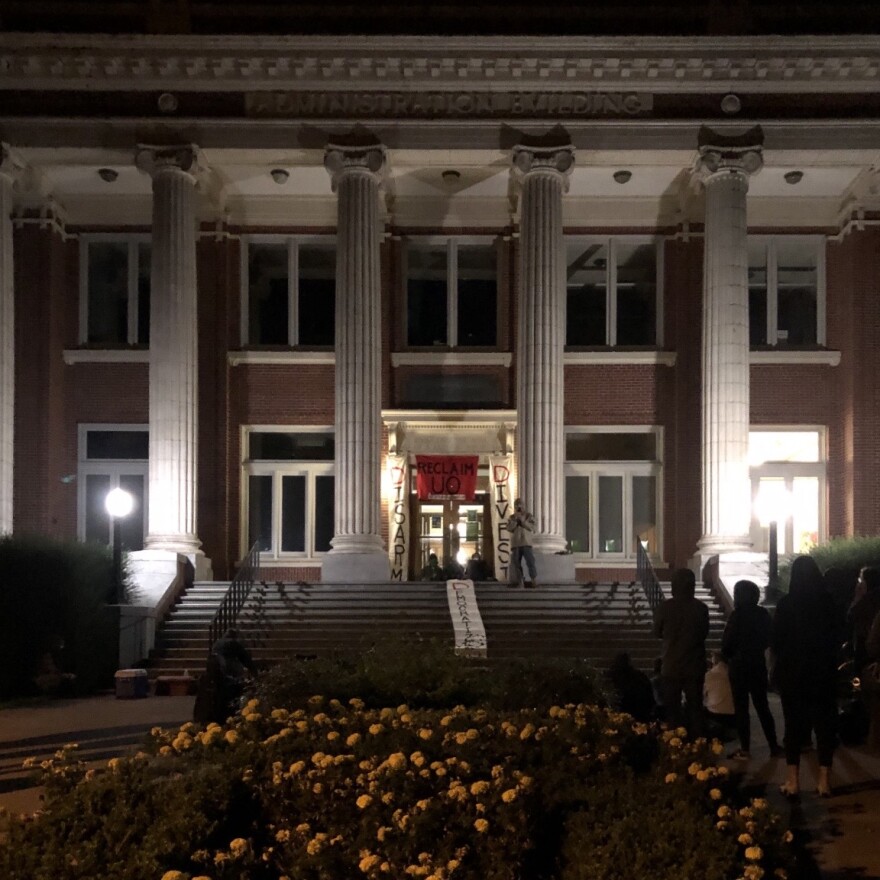University of Oregon students protested and held a sit-in on campus earlier this week. Now they want the UO to respond to three demands.
What started as a back to school gathering in support of Black Lives on Sunday at Eugene’s Washburne Park, ended with students marching to the UO campus. Three current and former students chained themselves to the doors of Johnson Hall for roughly 21 hours, and remained there until after President Schill spoke to them on Monday afternoon.
Now they’re asking the UO to meet the following demands. One, divest from the fossil fuel industry; two, disarm and dismantle UOPD; and three, democratize the Board of Trustees.
After informally speaking with President Schill, the group is demanding to meet with him by the end of next week. Their demands for the meeting include holding it in the EMU fishbowl with appropriate COVID-19 protocols, sound systems, and recording, as well as require that a meeting facilitator of their choice be present during the entire meeting.
The following are the rest of the demands for the meeting:
“A recording of the meeting and streaming for those who can't attend in person in order to create a true sense of transparency and accountability in the next steps on the path toward climate and racial justice.”
“One representative from [groups such as DisarmUO, ReclaimUO, and the Graduate Teaching Fellows Federation (GTFF) Graduate Student Union, Cascadia Action Network, and the Climate Justice League] is invited to attend the meeting in a collaborative capacity.”
“Require President Schill and his colleagues prepared to provide three concrete proposals to address the three main tenets of their demands; DIVEST, DISARM, and DEMOCRATIZE.”
According to a press release, if the protesters meeting demands are not fully met, they are “more than willing and prepared to walk out of the meeting and pursue escalated direct action against the University for its continued role in racial, economic and environmental injustices.”
Rhiannon Lindgren is the Vice President of Organizing for the Graduate Teaching Fellows Federation (GTFF) Graduate Student Union for University of Oregon. Although she was not a protest organizer , she said she supports the initiative and believes the community should support it as well.
“So much of what happens at the U of O really impacts the town and the city of Eugene at large,” said Lindgren. “I think that when we get to have a say in how our campus is run and when it's not just being determined by big business and investments, everyone in our community benefits from the people who are arguably the most important part of the university—the students. When they actually get to determine what their school looks like and how it functions, I truly believe that the entire Eugene community benefits from that kind of democratic and collaborative process.”
Lindgren said that as a public service and a public educational institution, it is the responsibility of the university to support and protect its constituents.
Although she believes it is not monetarily advantageous for the board to be democratized, Lindgren said it is necessary to have a campus that is partially determined by student and worker needs.
“The students are starting to get a little fed up, understandably so, with waiting,” said Lindgren. “The University of Oregon administration has a ton of resources. They have a yearly budget of over a billion dollars. They like to say that they're in a budget crisis—which to some degree, they have budget problems, certainly. But they also have a lot of money and we should not forget that fact that their yearly operating budget is $1 billion. That is a lot of money. So if the kinds of changes that people need require money, I don't think that should be an obstacle.”





